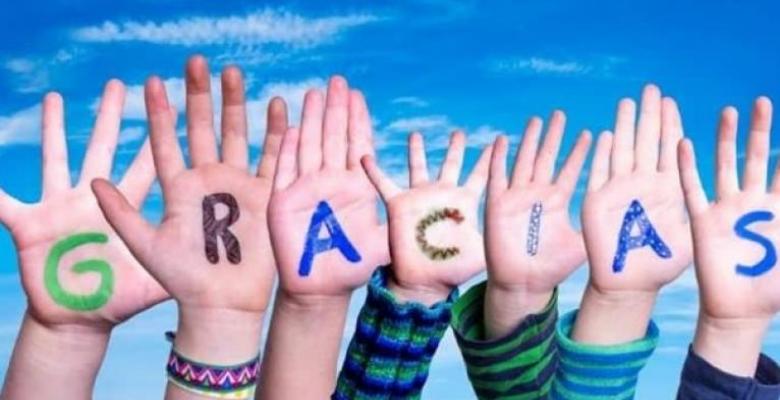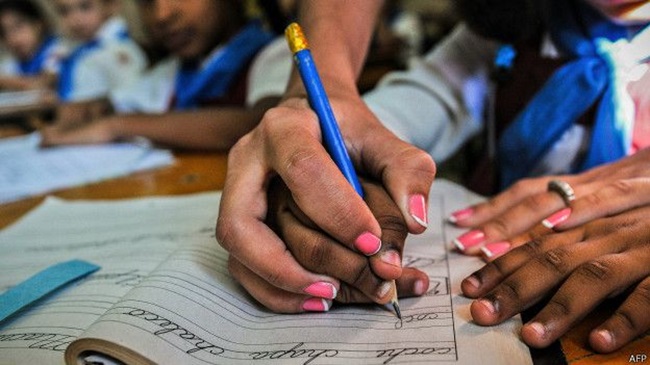Thank, a Verb to Always Conjugate
especiales

Although it may seem like a call with a certain religious implication, the call to always conjugate the verb thank in all tenses and pronouns is relevant because last January 11 the International Day of Gratitude took place.
But these lines are not only motivated by a celebration that, by the way, went practically unnoticed. The reason is that humans will always have something to be grateful for, and doing so makes us better.
Someone could say that, in general terms, humanity would have little to thank for so much war, poverty and so much damaged environment. Furthermore, on this island one might think that there would be little to be grateful for when watching the shortcomings, inefficiencies...
However, there has surely not been a lack of that friendly and even unknown hand to give the medicine, that treated you to a cup of coffee, that helped you cross the street or that simply patted your back in a saving hug.

In reality, the origin of this celebration is not known, nor do the UN or UNESCO include it in their agendas. In fact, it’s possible that it was born at the initiative of a company that sought to promote and sell its thank you postcards.
However, gratitude should be practiced every day for small or large gestures because it makes us happier, improves social relationships and also self-esteem, while at the same time it speaks of a good education, of courtesy, which seems to be on the brink of extinction in quite a few places.
Gratitude, that important
It seems that “Gratitude” is one of those words that has been banished from colloquial language, especially among the younger generations. We are not talking here about its practice, but about the word itself.

Perhaps it has had an expiration date, at least in everyday dialogue. But this should not be equivalent to making the custom of giving thanks disappear, both as an act of education practiced even with strangers, and as a feeling - gratitude - that arises very genuinely from the center of the soul, chest and even creates bonds for life.
Because there is no shortage of doctors, or teachers –just to mention two examples – who year after year receive thanks from their patients or students, who know them as saviors or shapers of their lives.
And gratitude is the positive emotion of thanking, as someone defined it, and everyone likes, even if they don't intend to, to receive gratitude from someone who has been the object of help or other attention; especially if the recipient of such contributions is someone appreciated or loved.
Of course, the first thing would be to realize what we receive from others and that does us good, both on the spiritual and material levels, and corroborate that goodness has not disappear, that "loving is not over"... despite everything.
Thus, gratitude contributes not only to facilitating or consolidating interpersonal relationships but also makes us more aware of others, their needs and also their goodness... or their ingratitude. Gratitude is so important and no small matter, that neuroscience has recently begun to make room for it in its research.
Being grateful has been understood as a “primary ability”, an evolutionary advantage that contributed to the survival of the species.
The professor at the Department of Experimental Psychology of the University of Seville, Dr. Manuel Vázquez-Marrufo, told the BBC on January 3 that studies carried out with neuroimaging address gratitude from the point of view of the brain's reward system, which helps us identify what we like, motivate us and recognize positive aspects of our
environment.

From science, today are investigated the immediate reactions that take place in the brain and in the body in general when gratitude is experienced.
“This pleasant or positive response seems to reduce the activity of the amygdala, which, if it becomes very active, produces inflammatory factors that cause the opposite: pain, tension, irritation,” points out the aforementioned Dr. Vázquez-Marrufo, who adds that “Major pillars of neurotransmission such as dopamine and serotonin could be involved in
the process of experiencing gratitude,” as is the case with other positive emotions.
For his part, emeritus professor of psychology at the University of California, Dr. Robert A. Emmons, points out that gratitude, as a complex state of cognitive and emotional components, “is good medicine” and supports with studies that prove how practicing it can contribute to lowering blood pressure, resolving to abandon addictions and reducing
stress.
“Gratitude is not simply a switch we turn on when life is going well, but gratitude also turns on a light in the darkness,” says the expert.
Education?
From children at home, the family teaches that you should say thank you when you receive a compliment, a gift, a favor... or, at least, that's how it should be.
But, unfortunately, it’s becoming less and less common in this geography to hear a “thank you” in everyday life.
Some educational norms are becoming worryingly blurred. There are those who justify it with the shortcomings and complexities of the present,
but no reason could support us becoming less human, which happens when insensitivity and other plagues win over.
This is precisely why education should not be accompanied by the formal adjective, because it must go together with the same essences that
differentiate us from non-rational animals.
So that the courtesy of thanking remains customary, below are some ways to colloquially express gratitude:
-Thank you so much
-I appreciate it
-Very kind
-I appreciate it
-I appreciate your kindness
-I will not forget your generosity
-It has been lucky to have your help
-Your support has been priceless
-I’m lucky to have your support
Even if you close your eyes when the sun hits your face, be thankful
that you can see it. You could respond to these expressions of gratitude using the phrases:
-To serve you
-With great pleasure
-Delighted
-It has been a pleasure
-You deserve it
-For whatever you need
-That was nothing or You're welcome.
The Urgent Spanish Foundation, FundéuRAE, states that this last expression, “you are welcome,” is completely correct and the Academic Dictionary points out that it’s
used “as a polite response when you thank someone for something.”

On September 13, 1892, from Santiago de los Caballeros, José Martí wrote to the then Major General Máximo Gómez, later generalissimo, to “help the revolution as the supreme person in charge of the branch of war, to organize inside and outside the Island the army” with a view to achieving independence.
In this regard, he warned Gómez: "I offer you, without fear of refusal, this new job, today when I have no other remuneration to offer you than the pleasure of sacrifice and the probable ingratitude of men."
Hopefully this text would contribute just a little to fewer people who pay for “the probable ingratitude of men.”
Translated by Amilkal Labañino / CubaSí Translation Staff













Add new comment